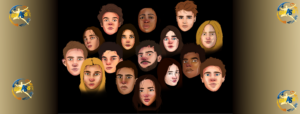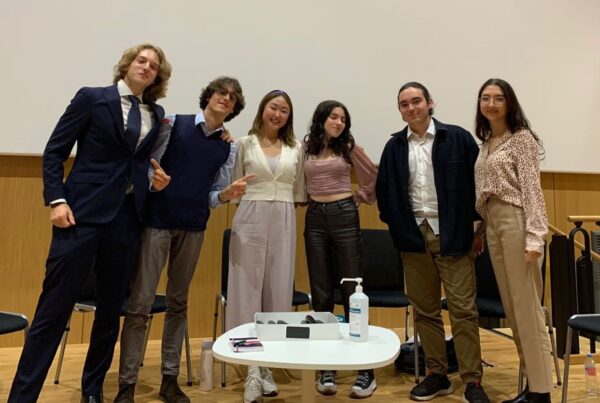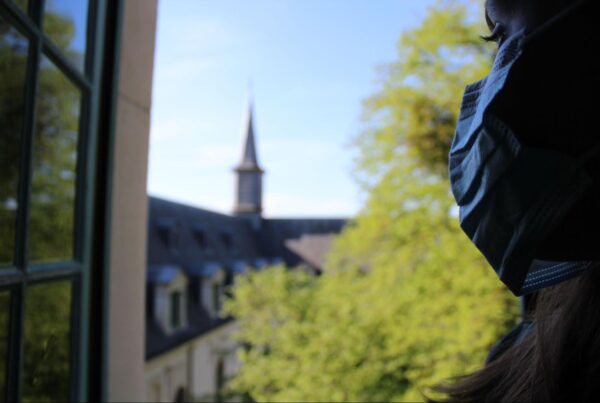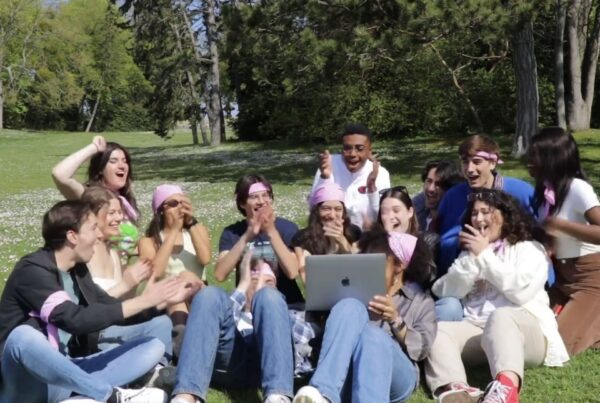
Interview by Michelle Wei and Maria Lee-Folch
This interview and the other campaign list interviews were conducted on Zoom by writers of the Sundial Press. To ensure uniformity across list interviews, interviewees were given the same amount of time to answer questions, and lists for the same permanent bureau (ex. the two BDA lists) received the same questions. The interviewees had not seen the questions they would be asked, and a member of the campaign committee also assisted and supervised the interview. Although the interviews have been edited for clarity and concision, everything written was said by the list members.
List members:
Executive Pole
Marco Gerbino: Co-president, Italian (EURAM)
Eva Lecompte: Co-president, French (EURAF)
Alice van Gaver: Secretary, French (EURAM)
Célia Ribière: Head of communications, French (EURAM)
Communications Pole
Isaiah Lowney-Piazzalunga: French and American (EURAM)
Victor Delphin-Schubert: Austrian and French (EURAM)
Coline Rochette: French (EURAF)
Events Pole
Irina Ludet: Head of events, French (EURAM)
Marie Ado Samaké: Wellbeing, French and Nigerian (EURAF)
Rémy Guerrier: Nightlife, French (EURAF)
Neelam Monroy: Surf trip, Colombian and American (EURAM)
Célestin Pineau: Ski trip, French (EURAM)
Treasury Pole
Lucien Chapotte: Head of treasury, French (EURAF)
Jamie Bitenyo-Jones: British and Rwandan (EURAM)
Competition Pole
Théo Crocq: French (EURAM)
Charlotte Allombert: French (EURAM)
Q: Why is your list running?
Theo Crocq: To start, I would say our list shares a passion for sports. The idea this year is for us to share this through the events that we’ll do, such as the parties and the competitive teams. We want our list to create a sense of unity and communion within our campus, since we believe that that is the role of the associations – especially of the AS.
Alice van Gaver: We all play very different sports and are involved in very different ways, but we share this passion. It’s pretty cheesy to say this, but we are running because we care about the AS’s mission on campus, and we have a vision of what this looks like and how we want to implement this next year. We are running because our campaign promises drive us and we would strive to achieve these promises. We have loads of ideas of new events, poles, parties as well as some conferences we want to organize. We have new innovative ways of expanding the AS’ reach on campus and we are willing to put in the work that this represents.
Neelam Monroy: We all share a very similar vision of the AS through different perspectives. For example, we want to add poles to the association – such as the Wellbeing Pole that Marie can talk more about. From personal experience, at the beginning of the year I did not know what a bureau was or what the AS was. I want to be able to share this with other people like me, who enter the campus without really knowing what it is. Because in the past months that we’ve been preparing the campaign, I’ve noticed how much passion and effort that, not only our list, but every list puts into it. I want it to be as inclusive as possible for everyone on campus, and accessible since day one.
Marie Ado Samaké: We want to show everyone that the AS is accessible to everyone, as at the beginning of the year, I thought the association was out of reach and out of touch.
Q: How will you make sports more accessible to students who are not involved in a sport already at Sciences Po, and how will you incentivize them to participate in your events?
Alice: The first way that we’re going to do this (and I’m saying this as the first way because it’s really the first impression that students will have of the AS) is that we are going to organize a Q&A session at the beginning of each semester. What was lacking for us at the beginning of this year was a clear explanation of what the AS’ role was. We want to organize meetings at the beginning of the two semesters – so exchange students arriving in second semester can also be correctly integrated – to explain, firstly, all the details on how you can join a sport, where the practices take place, what is needed and what costs it will entail, as well as the events that we will be organizing. We’ll be talking about trips because we also noticed that trips don’t necessarily include all students. For instance, there are very few exchange students who come to trips whereas, of course, they are also for them. And we will be explaining our role and how students can come get in touch with us. We really want to be accessible ourselves, and this will be the first step in making sports accessible for everyone.
Theo: Also, at the sports level, we really want to make it easier for internationals to join the sports at Sciences Po by working closely with captains and trying to incentivize captains to work closely with international students. It is really important, as we are an international campus, to have international students join our teams. Being part of a team this year, it has been a true richness to have these international people with us. Also sometimes, I know that some people with international backgrounds hesitate to join sports because sometimes they lack the material or equipment, for example shoes or shinguards. So we would like to work with our partners who can share equipment and obtain price reductions, and inform international students on where they can buy their stuff in order to join teams. That is a lot of work, but I think it is really important for us and that’s something that we want to put in place for next year.
Neelam: The main idea is inclusiveness. For example, we had a homecoming event in mind and it’s just to show that sports is not just for the people who play, but it’s supposed to be for the campus as a whole. For there to be campus spirit. For all the sports events and all the events that the AS plans – the parties, the homecoming – to be the representative of every student on campus.
Q: Talk to us about your list´s team spirit – what are the key assets to a well-functioning sports association on campus?
Alice: Firstly, I think it can seem very obvious but for us it is very important – it is the fact that we are all very different. During our meetings, we have so many ideas and we are so energetic. Maybe sometimes we are all talking over each other, but at the end of the day that means we are proactive in what we want to do. And I think that is very important because people don’t necessarily realize how much work goes into the AS, but since we’re all motivated to share what we have to offer to the students, we are very willing to put in the work. In our opinion, that is key for a well-functioning bureau.
Theo: I think it’s the same for work or in sports, you need to allocate your team well and that will be the key to your success. The diversity that we have in our list needs to be allocated properly to allow us to be efficient and allow everything to be clear for the students that follow us next year.
Marie: I think we really have a team spirit which allows us to be really close and to support each other, which is the strength of our list. We really are able to work together in a good environment.
Neelam: Regarding digital campaigns, there are a lot of things people may never see as they happen backstage during the planning. But this situation shows how much we manage to do things efficiently because, regardless of how the campaigns are going to take place, we managed to reorganize everything in a limited amount of time and redistribute the tasks we had to do. For example we have one Pole Comm, but right now it feels like everyone is in every pole and everyone is doing the best they can to help, even though it might not be in their area. We feel like we are just part of the list.
Alice: Everyone is putting in the effort during these difficult times and working together, to try and make the most of the current situation. Although we are so sad we won’t be able to spend campaign week together, we are still having daily Zoom meetings to try to reorganize ourselves. And that is a testament to what a bureau should look like: people working together to overcome all the problems we may encounter.
Theo: We are sad because we won’t be able to spend campaign week together, but also because we won’t be able to see people and share moments of the campaign on campus. That is a true disappointment because it would’ve been extraordinary.
Q: With regard to the current COVID-19 lockdown situation, neither the WEIC nor the Minicrit will take place this year, how do you plan to revive sports and team spirit on campus next year?
Alice: That’s very relevant to what we’ve planned, actually. We had an event originally on Saturday that was called a “beach day.” We had beach volleyball, we had “beach food,” loads of events; it was going to be very “Hawaiian” and very fun. In light of the situation, we decided to change this event and make it into an online WEIC because everyone on campus was so sad that we weren’t going to be able to welcome this WEIC. We’ll have a competition between everyone; they’ll be able to participate in this event live on Zoom. And there will be people who will be supporters, betting on people who they think will win between our lists. We’ll have this huge WEIC final live on Instagram. So it’s just a way for us to try to adapt and try to make people live these wonderful events. When people talk about the WEIC and the Minicrit, they have stars in their eyes and they’re so happy, so we’re trying the best we can to make people experience this even though they’re all in isolation. We think that this will really lift up spirits and entertain people.
Theo: And when talking about next year, we feel a true responsibility in organizing the future WEICs, or maybe the Minicrit, because so many people were frustrated that these events could not occur. They’re always events where you share memorable moments that stick in your mind. We know, for example, that the second years are really really disappointed about the fact that the WEIC will not occur, and the Minicrit even more so. We have a responsibility for that.
Marie: And I think that despite the fact that events are not going to happen on campus, we can still share links with people, Maybe even stronger ones because we are going to organize some meetings at our own places, and we will show moments of intimacy. I think it can be even more interesting this way.
Neelam: For next year, Theo pretty much summed it up, it’s the responsibility. We know that as first years, normally you’re supposed to go through the process of knowing how the Minicrit and how the WEIC goes. Without that, next year is going to be harder, but it’s also going to be an even more memorable experience for everyone because it’s our first time alongside the first years. So I think that makes it so much more important and we are very conscious about that.
Theo: We are the ones who will play for the WEIC and the Minicrit next year, and it also important to have solidarity between the ones that will play and the ones that will not.
Q: Is there one last thing you would like to add?
Marie: I didn’t have the opportunity to talk about the Wellbeing pole for next year. We really want people to be able to feel good with sports and with other activities. We want them to be able to feel good in their minds and be able to manage stress, especially during the exam period. Concretely, one of the ways this is going to happen is through yoga workshops.
Alice: If there is one thing one thing to remember from our list, it’s that we’re all very different individuals, but we are all similar in our love of sports and its role in student life. That is what we have united around and what motivates us to work very hard to bring you this campaign week. We hope that we will be so lucky to be honoured by the students giving us a chance to show them what we will do next year, and we are all confident that we would be a great bureau.
Theo: We know that it’s a disappointment we can’t have any physical events, but come to our digital events, because it’s going to be really good! We had planned to organize a pool party, it will now be a plouf party, but we encourage you to come because it is going to be so much fun. Please really do enjoy this campaign, even if we know that it could’ve been better, because it’s still going to be really good!
Other posts that may interest you:
- The Trouble with ‘Ecocide’
- Carbon dioxide removal – hit or miss?
- Local Victories for Turkish Opposition — A Sign of Hope?
- Are France and Japan a Mismatch Made in Heaven?
- A Reflection on Dark Tourism
Discover more from The Sundial Press
Subscribe to get the latest posts sent to your email.





